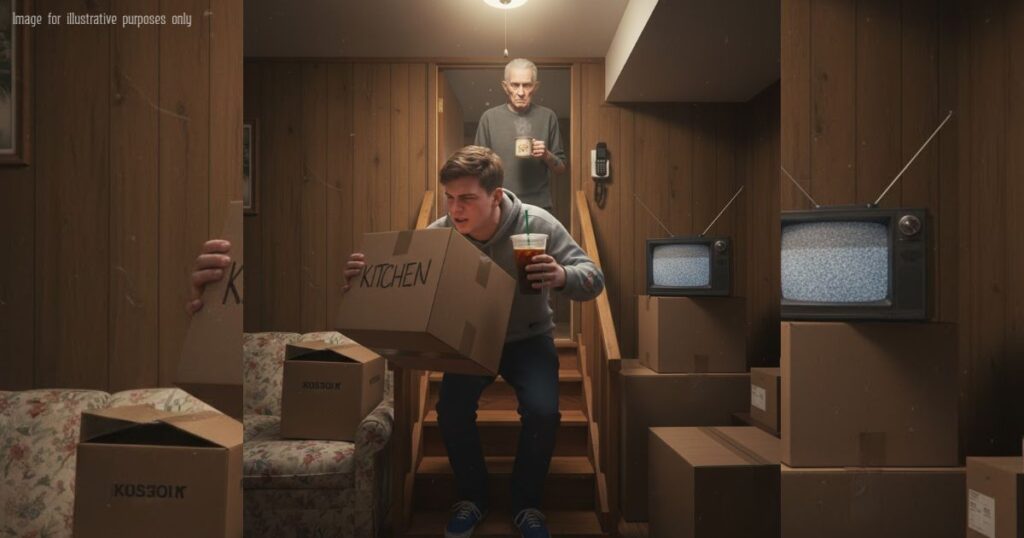I make $55,000 a year and I’m broker than my 75-year-old grandpa. To save myself from my $1,800-a-month studio apartment, I had to move into his basement.
This wasn’t the plan.
The plan was a downtown loft, happy hours, and a vibrant social life funded by my new marketing degree. Instead, I’m in suburban Ohio, sleeping on a 1980s sofa bed in a room that smells like cedar wood and mothballs.
“It’s just temporary,” I told myself, clutching my artisan iced coffee as I hauled in the last box.
“That stuff costs five bucks?” Grandpa Frank asked from the doorway. He was holding a steaming mug of black instant coffee that looked thick enough to pave a driveway.
“It’s $7.50, Gramps,” I corrected him. “And it’s a small luxury. I worked hard for this job. I deserve a treat.”
Frank just grunted. “You ‘deserve’ to pay off that $40,000 school debt you keep complaining about. I just drink coffee. You drink a car payment.”
Living with Frank was like living with a ghost from a history book. A very judgmental history book.
His house was a museum of thrift. There was one television—a small, buzzing box he’d owned since my dad was in high school. He got three channels with an antenna. I had subscriptions to four different streaming services on my laptop, which I paid for by “browsing” more than actually watching.
“Why you paying for all those shows?” he asked one night, squinting at my screen.
“It’s choice, Gramps. Options.”
“Looks like a waste of time,” he said, turning his attention back to the local news.
The real flashpoint was food. On Friday, after a brutal week of spreadsheets, I was exhausted. I didn’t want to cook. I wanted convenience. I opened my favorite food delivery app and ordered a $28 artisan burger.
When the delivery driver pulled up, Frank was on the porch. He watched me take the bag like I had just committed a felony.
That night, he was eating what he called “Whatever’s-Left-Casserole,” which appeared to be leftover hotdogs, some beans, and half an onion, baked. It looked awful. It probably cost $2.
“Must be nice,” he muttered, spooning the brown sludge onto his plate. “Eating like royalty.”
“It’s just one burger, Frank!” I snapped, the stress of my loan payments boiling over. “The economy is terrible! Inflation is insane. I can’t even afford rent. You guys had it easy! You bought this whole house on one salary!”
Frank put his fork down. It was the first time I’d seen him look genuinely angry.
“Easy?” he said, his voice dangerously quiet. “I started at the steel mill at 18. I worked 12-hour shifts, six days a week. When inflation was 10% in the 80s, my mortgage rate was 14%. I didn’t eat ‘artisan’ anything. I ate a bologna sandwich. Every. Single. Day.”
He pointed at my laptop. “You got a $1,200 phone. My phone,” he gestured to an ancient flip phone in a cradle by the wall, “makes calls. You got a tattoo sleeve that cost more than my first car. My tattoos?” He rolled up his sleeve to show a faded blue anchor. “Got this in the Navy. It came with nightmares, not a payment plan.”
I felt my face flush. “So what, I’m just supposed to be miserable?”
“You’re not miserable!” he barked. “You’re just soft. You kids want the reward without the work. You want the house, but you won’t give up the $7 coffee. You want financial freedom, but you pay $28 for a burger because you’re too ‘tired’ to open a can of soup.”
He walked over to his old roll-top desk and pulled out a small, vinyl-bound bank book. He tossed it on the table. It was a passbook for his savings account.
I opened it.
The balance made my stomach drop. From his factory pension and social security, this man who lived on canned soup and instant coffee had saved over $280,000.
I looked at the balance. I looked at my phone, still open to the delivery app. I looked at the $9 remaining on my $28 burger.
Frank picked up his plate of leftovers.
“You’re right, Alex,” he said, heading to the kitchen. “I bought this house on one salary. But I also didn’t have 47 subscriptions, leased cars, or ’emotional support’ smoothies.”
He stopped at the doorway and looked back, his eyes drilling into me.
“You don’t have an income problem. You have an expense problem. You’re not poor. You’re just paying a subscription to act rich.
—
I didn’t sleep much after the passbook ambushed my pride. The number sat in my head like a brick in a dryer. At 6 a.m., I crept upstairs to the kitchen, thinking I’d make a silent peace offering: eggs, toast, maybe a truce.
Frank was already there, in a flannel shirt that had outlived three fashion cycles, stirring a pot of oatmeal like it owed him money. He slid a bowl toward me without looking up.
“Eat,” he said. “Then we’ll work.”
“I have a job,” I muttered.
He tapped the passbook with a knuckle, a soft drum on vinyl. “Today, your second one.”
We ate. The oatmeal had exactly two flavors: hot and honest. After, he took me to the dining room, where the roll-top desk yawned open like a church confessional. He set out three old mason jars, their metal lids dented and their labels written in thick pencil.
NEEDS. FUTURE. FUN.


